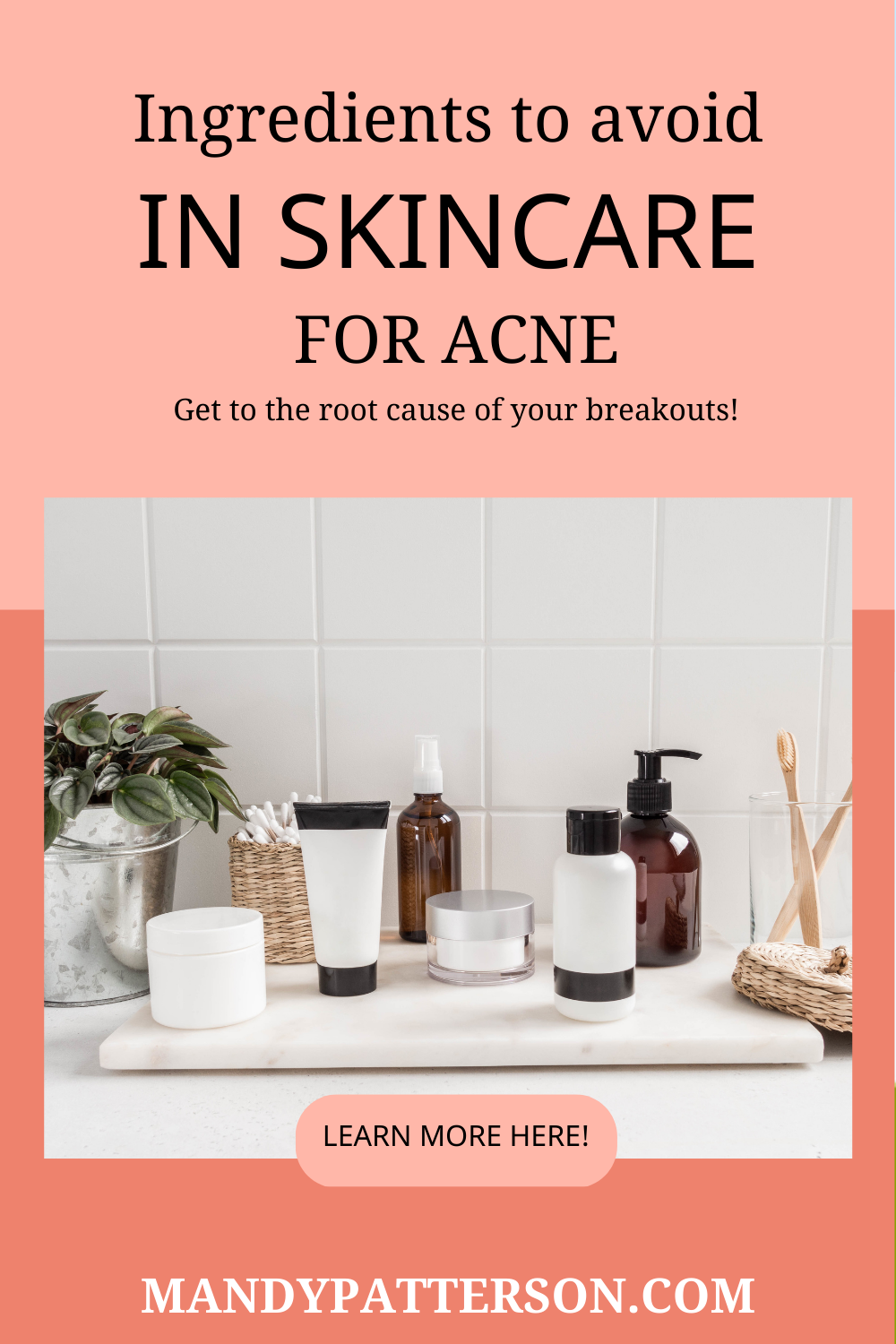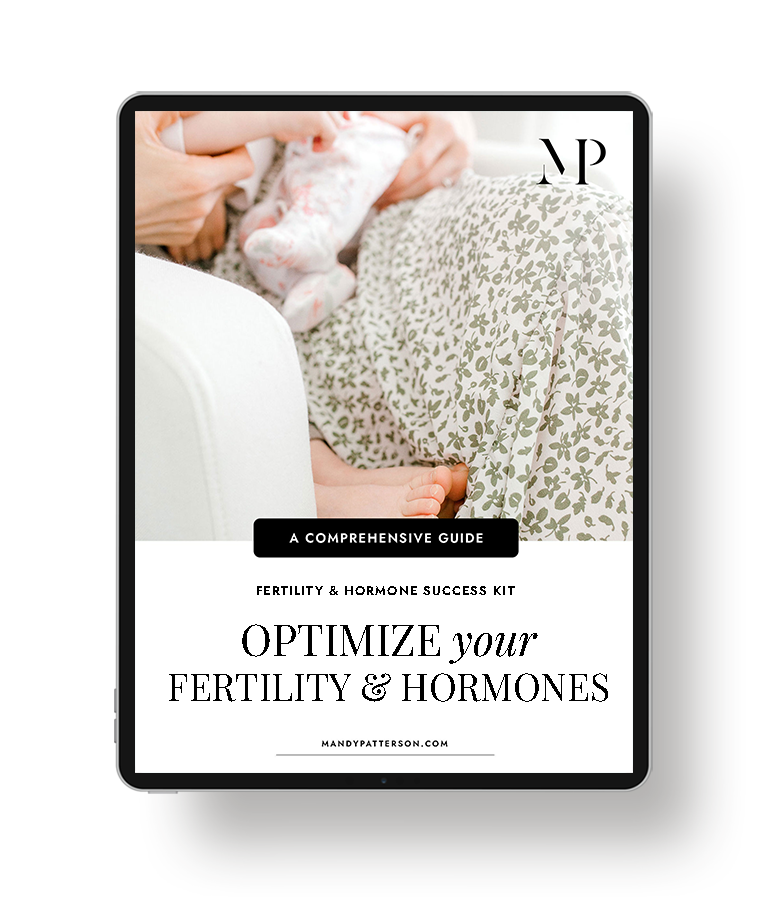Acne is one of those health conditions that can be debilitating to your self-esteem. When you have hormonal or gut imbalances, inflammation, or problems detoxing, this can show up on your skin as acne. Most skincare products are chock full of harmful chemicals contributing to these health conditions! This article will cover the ingredients to avoid in skincare for acne-prone individuals.
What Causes Acne?
The hair follicles, or pores, in your skin contain sebaceous glands. These make oil that lubricates your hair and skin, called sebum. Most of the time, the sebaceous glands produce the right amount of sebum. However, fluctuating hormones stimulate the sebaceous glands to make more sebum leading to acne breakouts until the hormone and sebum levels are balanced.
Further, pores can become clogged if there is too much sebum and too many dead skin cells. Bacteria can then get trapped inside the pores and multiply. This combination of events causes swelling and redness, or the start of acne.
There are four types of ways a pore can develop acne:
- A whitehead is a pore that gets clogged, closes, and bulges out from the skin.
- A blackhead is a pore that gets clogged but stays open, with a darker top surface.
- If the wall of a pore opens and lets sebum, bacteria, and dead skin cells make their way under the skin, it can cause a small red bump called a pimple.
- A clogged pore that opens up very deep in the skin can cause nodules.
Moreover, research has shown that underlying gut disorders like leaky gut syndrome, yeast overgrowth, SIBO (small intestinal bacterial overgrowth), and gut dysbiosis contribute to poor skin health.
When your skin breaks out, your body is signaling for help. It’s a red flag from your insides to your outsides.
Healing Acne Starts on the Inside
Getting your health back in order will do wonders for your physical appearance. While life is not all about appearances, when you feel good, you look good, too. Focusing on gut health, sleep, exercise, stress management, a whole foods diet, and the elimination of environmental toxins will benefit your outward appearance. Say goodbye to acne, rashes, bloating, and inflammation for good!
That being said, many personal care products expose you and your family to toxic chemicals that lead to inflammation and hormonal imbalances.
While the European Union has banned approximately 1,400 harmful chemicals and ingredients from personal care products, the United States has only banned about 30. To make matters worse, the average woman uses 12 personal care products a day, exposing her to over 168 unique chemicals, all before she even walks out the door.
Without further ado, here are the ingredients to avoid in skincare for acne:
Synthetic Perfumes
The truth about skincare products is that the words “fragrance” or “perfume” on an ingredient list can often mean a mix of dozens of chemicals, any of which can be irritating to acne-prone skin. Synthetic fragrances are a significant source of skin allergies and can cause inflammation and irritation, which makes treating acne even more difficult. In addition, because a fragrance is a mix of other ingredients that are not disclosed, there is no knowing what you’re putting on your skin.
Sodium Lauryl Sulfate
SLS can cause severe skin irritation, and there’s a higher rate of contact allergy to it. Its oil- and skin-stripping properties may clog pores and cause acne for people with sensitive or acne-prone skin.
Isopropyl Myristate and Isopropyl Palmitate
Isopropyl myristate is a penetration enhancer that increases active ingredients’ absorption into the skin. It is a comedogenic ingredient because it can lead to blackheads by blocking the skin’s pores.
The thickness of the chemicals in isopropyl palmitate can deprive the skin of nutrients such as oxygen. If the skin doesn’t breathe, your pores can become clogged, and healthy skin cells can die, leading to dry, flaky skin. In addition, industry tests on rabbits indicate the chemical can cause skin irritation and dermatitis.
SD Alcohol 40, Denatured Alcohol, Ethanol, and Isopropyl Alcohol
When used in toners and exfoliating products, these specific forms of alcohol become drying and irritating to the skin’s overall health. Using products that dry your skin out cause your body to produce more oil to compensate for the lack of it, thus leading to an increase in acne breakouts.
Natural Tips To Help Reduce Acne
Any beauty routine starts with good nutrition and lifestyle practices as well as addressing underlying health issues. Your first step to overcoming acne is to uncover any underlying health issues that may be contributing to the problem. The second step is to avoid the above-mentioned ingredients commonly found in skincare products.
Here are a few final tips to help reduce acne:
- Use moisturizer. Contrary to what you might believe, if you are acne prone with an oily skin type, your skin still needs moisture. Keep your skin hydrated so it doesn’t produce more oil, causing more acne.
- Avoid washing with hot water and over-exfoliating your skin. Overdoing either of these can strip the skin of its natural oils, leading to an overproduction of oils and more acne.
- Consider eliminating sugar. Sugar raises insulin levels, which promotes the production of testosterone in women, and inflammation in general, causing acne. Research indicates that people who had higher sugar intake and a high glycemic load diet had significantly more acne.
- Consider eliminating dairy. Hormones (including growth hormones) in dairy contribute to acne. Two large controlled trials found cow’s milk increased both the number of people who got acne and its severity.
Work with a Fertility Health Coach
As a fertility health coach and mom of six (yes, I said six!), I understand the debilitating effects of acne. If you are struggling with acne and want to get to the root cause of your breakouts to get your health back in order, reach out to me! Through functional lab work and an extensive health history, I will create a personalized protocol to help you achieve optimal health. Learn more here!

















